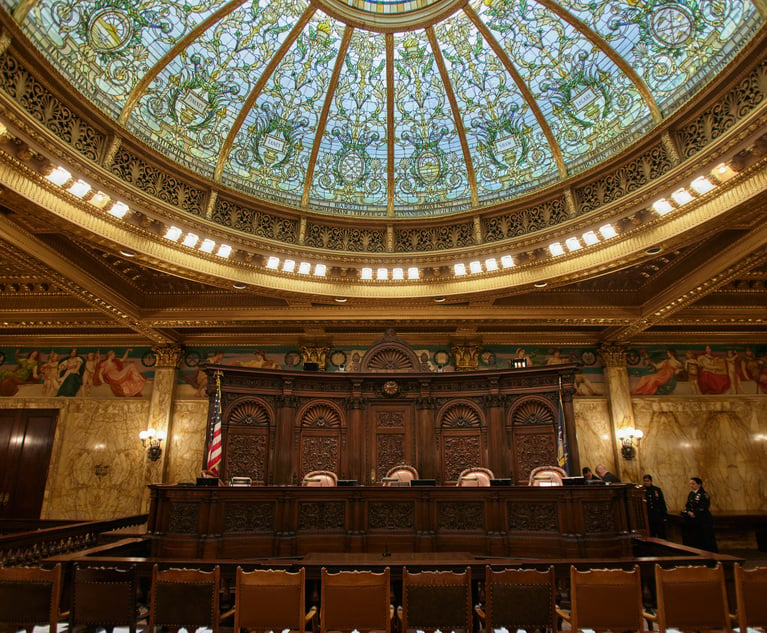No 'Knowability' Requirement for Theft Losses: 'Adkins v. United States'
n their Taxation column, David E. Kahen and Elliot Pisem discuss the allowability of a theft loss deduction in a particular year has often been challenged by the IRS, particularly on the grounds that the injured taxpayer had a "reasonable prospect of recovery" against the wrongdoer or someone else in the year of discovery.
June 17, 2020 at 12:51 PM
9 minute read
 Elliot Pisem and David E. Kahen
Elliot Pisem and David E. KahenA taxpayer is allowed an income deduction for many losses "sustained during the taxable year and not compensated for by insurance or otherwise." For these purposes, a loss from theft is generally treated as "sustained" during the taxable year in which the taxpayer discovers the loss. However, if a claim for reimbursement with a "reasonable prospect of recovery" exists, no part of any loss for which reimbursement may be received is considered to be "sustained" until the taxable year in which it can be ascertained with reasonable certainty whether or not such reimbursement will be received. The allowability of a theft loss deduction in a particular year has often been challenged by the IRS, particularly on the grounds that the injured taxpayer had a "reasonable prospect of recovery" against the wrongdoer or someone else in the year of discovery.
In Adkins v. United States (125 AFTR 2d 2020-____), a recent decision of the U.S. Court of Appeals for the Federal Circuit, the court rejected the argument of the government, accepted by the Claims Court below, to the effect that a theft loss could not be claimed in a year in which the prospects of recovery were "unknowable." The court of appeals held that a theft loss was allowable in the year in which it became apparent that there was no reasonable prospect of recovery, whether or not there remained a remote possibility of recovery in the later year.
Facts in 'Adkins'
The theft losses at issue resulted from investments in securities made by Charles and Jane Adkins over a four-year period beginning in 1997. The Adkinses were induced to make these investments by principals and employees of Donald & Co. That brokerage firm was operating a "pump-and-dump" scheme, under which it would purchase large blocks of stock in little-known corporations and then encourage its clients to buy additional shares in those corporations in purchases that would inflate the price of the stocks. Donald & Co. would then sell the stock it owned in those corporations, resulting in gains on its purchases, but causing the stock price to decline, and its clients incurred substantial losses.
The value of the Adkinses' investment account with Donald & Co. dwindled from $3.6 million in February 2000 to less than $10,000 by the end of 2001, causing Mr. Adkins to investigate in early 2002 and to realize that he had been defrauded. He filed a statement of claim with the NASD against the brokerage firm and various individuals associated with the firm, in support of a demand for arbitration. The brokerage firm ceased operations in July 2002 due to insufficient capital.
In March 2003, an attorney representing the Adkinses requested by letter that the NASD adjourn an arbitration hearing scheduled for April 1, stating that the brokerage firm had not responded fully to discovery demands and that additional time was therefore needed for discovery. The letter also noted that the Department of Justice had commenced an investigation into the matter and observed that, if an indictment were handed down, the U.S. Attorney would request that all civil litigation involving the brokerage firm, including the arbitration, be stayed pending disposition of the criminal case.
Although the arbitration claim was not abandoned by the Adkinses in 2003, Mr. Adkins did then inform his attorneys that he "wasn't going to pay them anymore and there's no real need to pursue it" while awaiting the indictments. Indictments were returned in May 2004 and thereafter against the brokerage firm and several of its principals and employees, at least some of whom agreed later in the year to plead guilty, resulting in fines in excess of $1.75 million as well as terms of imprisonment and forfeitures. To the dismay of the Adkinses, the indictments did not mention the stock of the corporation with respect to which the Adkinses had incurred the bulk of their losses.
Mr. Adkins was told by a government investigator that the government's focus was on money laundering aspects of the case, and not on the securities fraud that resulted in the Adkinses' losses, and Mr. Adkins believed, based on the contents of the indictments and his discussions with the agent, that there would be no funds available for restitution to him and his wife after taking into account the anticipated seizures and fines.
The Adkinses' attorneys were told in 2004 that SEC orders would issue to bar the named principals from acting as brokers or dealers in securities, and such orders were issued in 2005. The expectation of those SEC orders in 2004 caused Mr. Adkins to believe that the principals would not have substantial earnings in the future from which an arbitration award could be paid.
The Adkinses' arbitration proceeding continued to be postponed at the request of their attorneys until the arbitration claim was finally withdrawn in 2008. None of the victims named in the matter ever received more than de minimis reimbursement or restitution, and the Adkinses, according to the record before the court, did not have any insurance or other vehicle for recovery of losses attributable to the scheme.
The Adkinses claimed losses from the scheme as a theft loss through an amended tax return filed with respect to 2004, reflecting a total theft loss of $2,118,725, and sought to carry back portions of the loss to three preceding years, thereby claiming tax refunds for 2001 through 2004. The claims were ultimately denied by the IRS, and the Adkinses filed suit in the Claims Court in 2010 seeking income tax refunds.
Discussion
The government conceded in its briefs that the plaintiffs' investment losses attributable to stock purchases made through Donald & Co. constituted a theft loss, but asserted that 2004 was not the correct year to claim that loss. In the first decision of the Claims Court after trial on this issue (117 AFTR 2d 2016-779), that court, relying on an earlier case of the same court, interpreted Reg. section 1.165-1(d)(2) to impose a standard for allowance of a theft loss in a year after discovery of the loss—namely, that the taxpayer must ascertain "with reasonable certainty" that no reimbursement will be received—higher than the "reasonable prospect of recovery standard" that was clearly applicable to losses claimed in the year in which they were discovered. Further, the Claims Court, relying on an example in the regulation, appeared to conclude that once arbitration was sought, the loss could not thereafter be claimed until the year in which the arbitration claim was resolved or abandoned.
On appeal, the Federal Circuit rejected the Claims Court's view that the standard for determination of whether it could be "ascertained with reasonable certainty" that no reimbursement will be received was different from the standard for determining whether the loss could be deducted in the year of discovery, namely, whether there was a reasonable prospect of recovery (119 AFTR 2d 2017-1743 ("Adkins I")). To the contrary, if there was a reasonable prospect of recovery in the year of discovery, that same standard was also applicable in each later year to determine whether the loss was ultimately allowable.
The Federal Circuit further concluded in Adkins I that the circumstance that the Adkinses did not abandon the arbitration in 2004 did not mean that they still had a reasonable prospect of recovery; that circumstance was only one factor to be considered in evaluating the prospects for recovery in that year. The case was therefore remanded to the Claims Court for further proceedings.
On remand, the Claims Court considered whether the Adkinses had established that they had no reasonable prospect of recovery in 2004 (122 AFTR 2d 2018-6439). The opinion notes that the Adkinses had not investigated any of the financial condition of the individuals against whom the Adkinses had claims, the likely extent of those individuals' obligations of restitution to others, and their ability to satisfy those obligations. The government argued to the Claims Court that, taking the above into account, "plaintiffs' reasonable prospect of recovering their losses through restitution was simply unknowable in 2004." The Claims Court agreed and again denied the theft deduction.
On appeal, the court of appeals for the Federal Circuit again reversed the Claims Court (Adkins II). The Federal Circuit opinion in Adkins II observes that an "unknowable" standard was referenced in a decision of the U.S. Court of Appeals for the Tenth Circuit (Jeppsen v. Commissioner, 80 AFTR 2d 97-7710)), which had stated, in the context of another claim for a theft loss arising from broker misconduct, that a theft loss could not be sustained if the prospects of the taxpayer's case in the year at issue were "unknowable." Adkins II characterized this statement as dictum (there having been substantial reason to think that the taxpayer's claim in Jeppsen had reasonable prospects for success in the year at issue); noted that reference to an "unknowable" standard was criticized by a dissent in Jeppsen; and declined to adopt this standard, stating that "the governing statute and regulations do not require affirmative proof that a taxpayer's loss will never be recovered."
The court of appeals reiterated that the relevant standard in the year of discovery and thereafter was whether there was a reasonable prospect of recovery, and that a taxpayer "need not exhaust every avenue of recovery" and could take into account costs and all the other relevant facts and circumstances in deciding whether there were reasonable prospects for a net recovery. The court concluded that the record demonstrated that the Adkinses had no reasonable prospect of recovery in 2004 and that the Claims Court clearly erred when it determined to the contrary. The case was therefore remanded for a calculation of the Adkinses' refunds for the tax years implicated by the refund claim.
Observations
It was unfortunate for the Adkinses that their refund claim necessitated such lengthy and presumably costly court proceedings. For others who may be confronted with a loss from theft, however, and who have a reasonable prospect of recovery in the year of discovery of the loss, the most recent Adkins decision should be welcomed as upholding a common sense approach to the determination of when such a loss may be allowable in a later year as a deduction.
Elliot Pisem and David E. Kahen are members of the law firm of Roberts & Holland LLP.
This content has been archived. It is available through our partners, LexisNexis® and Bloomberg Law.
To view this content, please continue to their sites.
Not a Lexis Subscriber?
Subscribe Now
Not a Bloomberg Law Subscriber?
Subscribe Now
NOT FOR REPRINT
© 2025 ALM Global, LLC, All Rights Reserved. Request academic re-use from www.copyright.com. All other uses, submit a request to [email protected]. For more information visit Asset & Logo Licensing.
You Might Like
View All
Decision of the Day: Trial Court's Sidestep of 'Batson' Deprived Defendant of Challenge to Jury Discrimination

Decision of the Day: Commercial Division Finds Defendant Engaged in Unfair Competition Against Plaintiff

Decision of the Day: Court Rules on Judgment Motions Over Police Killing of Pet Dog While Executing Warrant

Decision of the Day: JFK to Paris Stowaway's Bail Revocation Explained
Law Firms Mentioned
Trending Stories
- 1Uber Files RICO Suit Against Plaintiff-Side Firms Alleging Fraudulent Injury Claims
- 2The Law Firm Disrupted: Scrutinizing the Elephant More Than the Mouse
- 3Inherent Diminished Value Damages Unavailable to 3rd-Party Claimants, Court Says
- 4Pa. Defense Firm Sued by Client Over Ex-Eagles Player's $43.5M Med Mal Win
- 5Losses Mount at Morris Manning, but Departing Ex-Chair Stays Bullish About His Old Firm's Future
Who Got The Work
J. Brugh Lower of Gibbons has entered an appearance for industrial equipment supplier Devco Corporation in a pending trademark infringement lawsuit. The suit, accusing the defendant of selling knock-off Graco products, was filed Dec. 18 in New Jersey District Court by Rivkin Radler on behalf of Graco Inc. and Graco Minnesota. The case, assigned to U.S. District Judge Zahid N. Quraishi, is 3:24-cv-11294, Graco Inc. et al v. Devco Corporation.
Who Got The Work
Rebecca Maller-Stein and Kent A. Yalowitz of Arnold & Porter Kaye Scholer have entered their appearances for Hanaco Venture Capital and its executives, Lior Prosor and David Frankel, in a pending securities lawsuit. The action, filed on Dec. 24 in New York Southern District Court by Zell, Aron & Co. on behalf of Goldeneye Advisors, accuses the defendants of negligently and fraudulently managing the plaintiff's $1 million investment. The case, assigned to U.S. District Judge Vernon S. Broderick, is 1:24-cv-09918, Goldeneye Advisors, LLC v. Hanaco Venture Capital, Ltd. et al.
Who Got The Work
Attorneys from A&O Shearman has stepped in as defense counsel for Toronto-Dominion Bank and other defendants in a pending securities class action. The suit, filed Dec. 11 in New York Southern District Court by Bleichmar Fonti & Auld, accuses the defendants of concealing the bank's 'pervasive' deficiencies in regards to its compliance with the Bank Secrecy Act and the quality of its anti-money laundering controls. The case, assigned to U.S. District Judge Arun Subramanian, is 1:24-cv-09445, Gonzalez v. The Toronto-Dominion Bank et al.
Who Got The Work
Crown Castle International, a Pennsylvania company providing shared communications infrastructure, has turned to Luke D. Wolf of Gordon Rees Scully Mansukhani to fend off a pending breach-of-contract lawsuit. The court action, filed Nov. 25 in Michigan Eastern District Court by Hooper Hathaway PC on behalf of The Town Residences LLC, accuses Crown Castle of failing to transfer approximately $30,000 in utility payments from T-Mobile in breach of a roof-top lease and assignment agreement. The case, assigned to U.S. District Judge Susan K. Declercq, is 2:24-cv-13131, The Town Residences LLC v. T-Mobile US, Inc. et al.
Who Got The Work
Wilfred P. Coronato and Daniel M. Schwartz of McCarter & English have stepped in as defense counsel to Electrolux Home Products Inc. in a pending product liability lawsuit. The court action, filed Nov. 26 in New York Eastern District Court by Poulos Lopiccolo PC and Nagel Rice LLP on behalf of David Stern, alleges that the defendant's refrigerators’ drawers and shelving repeatedly break and fall apart within months after purchase. The case, assigned to U.S. District Judge Joan M. Azrack, is 2:24-cv-08204, Stern v. Electrolux Home Products, Inc.
Featured Firms
Law Offices of Gary Martin Hays & Associates, P.C.
(470) 294-1674
Law Offices of Mark E. Salomone
(857) 444-6468
Smith & Hassler
(713) 739-1250






